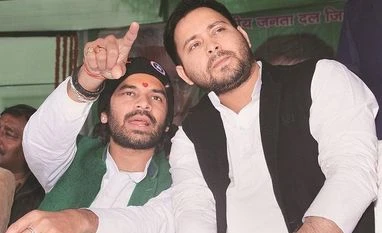The Centre’s decision to provide 10 per cent reservation to the economically weaker sections has put political parties of Bihar in a fix. Despite vociferously supporting the constitutional amendment Bill in Parliament, Bhartiya Janata Party (BJP) managers are shying away from openly siding with it. Its ally, the Janata Dal (United) or JD (U), too, is lending only conditional support to the move.
On the other hand, the Rashtriya Janata Dal’s (RJD’s) opposition to the quota sounds more technical than ideological. The reason for this “neither here, nor there” approach is more political than it seems. Both the National Democratic Alliance (NDA) and the Grand Alliance need a delicate balance of upper castes’ influence and backward communities’ votes to secure a win in the Lok Sabha polls.
Lurking fear
The BJP’s poll managers are happy with prospects of the quota’s galvanising impact on the upper caste voter, but the lurking fear of a possible caste backfire is keeping them busy. “In the run-up to the Bihar Assembly election in 2015, (RJD chief) Lalu Prasad used RSS chief Mohan Bhagwat’s call for a review of the reservation policy to turn the polls into a backward-forward battle. We have to be careful,” said a party functionary.
Therefore, the party is trying hard to woo the backward caste voters. Senior BJP leader and Deputy Chief Minister Sushil Kumar Modi last week announced that the state government might increase 37 per cent reservation in the next Panchayat polls to 50 per cent. He also said the Narendra Modi government would conduct a caste-wise census in 2021.
JD (U) supremo and Bihar Chief Minister Nitish Kumar while extending support to the EWS quota, he demanded the removal of the cap on the SC/ST and OBC reservations. “There should be a quota for each caste in proportion to its share in the population. For this, the Centre must conduct a caste census,” he said last week.
The dichotomy
The announcement has also put the RJD in a fix. While the party denounced the constitutional amendment in Parliament, the quota triggered a division of opinion among its top echelons. Senior RJD leader and former Union minister Raghuvansh Prasad Singh admitted that the party’s stance was a “mistake”. “We are not against reservation for the poor among upper castes. It’s even in our manifesto. It’s a mistake not to support the Bill in Parliament... Chuk toh hui hai,” Singh said earlier this month.
Even Lalu Prasad’s younger son and Leader of the Opposition in Bihar Assembly Tejashwi Yadav clarified that the party was only against the “manner” in which the quota was brought. “Has the government any supporting data or figures to support this claim? It doesn't. The Modi government is implementing the quota in a hurry,” he had said.
Political compulsions
Experts say political parties do not want to disturb their delicately woven social equations. “Poverty affects all. However, political parties are too afraid to say it given their compulsions. The BJP-JD (U) alliance is afraid of a possible backlash from backward communities, whereas the RJD-led Grand Alliance needs upper caste support to win several constituencies,” N K Chaudhary, former head of department (Economics) of Patna University, told Business Standard.
To register a thumping victory in the Lok Sabha polls, the JD (U)-BJP alliance would have to garner support from across communities. In 2014, the BJP-led NDA had secured 31 seats in the 2014 Lok Sabha polls, while the saffron party’s vote share jumped from 14 to 29 per cent. Votes from backward communities, particularly from economically backward castes, had played an instrumental role. In the RJD’s pocket boroughs like Saran and Pataliputra even the Yadavs voted for the BJP.
Meanwhile, apart from its traditional Muslim-Yadav base, the Grand Alliance would need support from upper castes in almost a dozen seats.
Electoral equations
The Lok Sabha constituencies are yet to be divided among the NDA partners. Leaders, however, believe that while the quota might bring upper caste voters to the alliance, the saffron party would still need support from backward castes in at least 10 seats.
For example, Union Agriculture Minister Radha Mohan Singh would need votes of the Baniyas in East Champaran seat. Union ministers R K Singh and Ashwini Choubey would also need support from backward communities in their respective Ara and Buxar constituencies. These voters would also play a crucial role in the prospects of the BJP candidates in Saran, Madhubani, Sasaram, Gaya, Sitamarhi and Jhanjharpur.
On the other hand, Kumar would have to display social engineering skills to bring together forward and backward castes in a dozen seats. The JD (U) would need this to register a win in seats like Munger, Banka, Supaul, Purnia, Darbhanga and Jehanabad.
The situation is still unclear in the Grand Alliance. The Congress and the former CM Jitam Ram Manjhi's Hindustani Awami Morcha are supporting the upper caste quota, whereas the RJD is opposing it. The alliance would need the support of the upper castes in seats like Darbhanga, Muzaffarpur and Bettiah.
Unlock 30+ premium stories daily hand-picked by our editors, across devices on browser and app.
Pick your 5 favourite companies, get a daily email with all news updates on them.
Full access to our intuitive epaper - clip, save, share articles from any device; newspaper archives from 2006.
Preferential invites to Business Standard events.
Curated newsletters on markets, personal finance, policy & politics, start-ups, technology, and more.
)